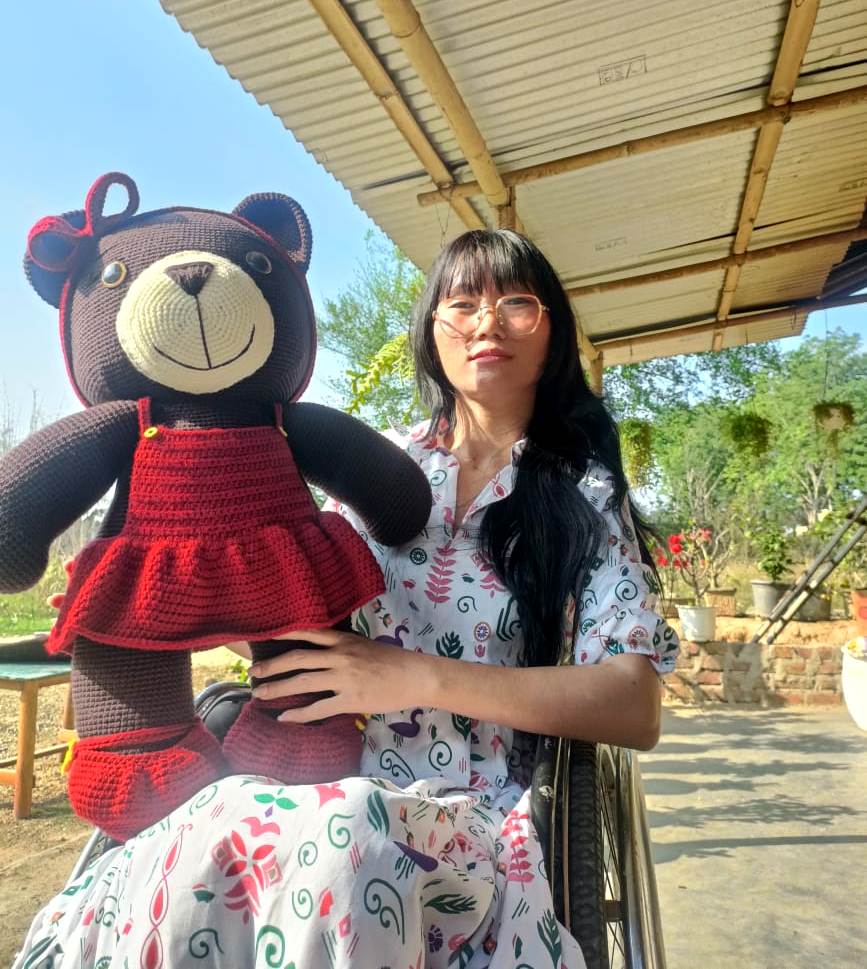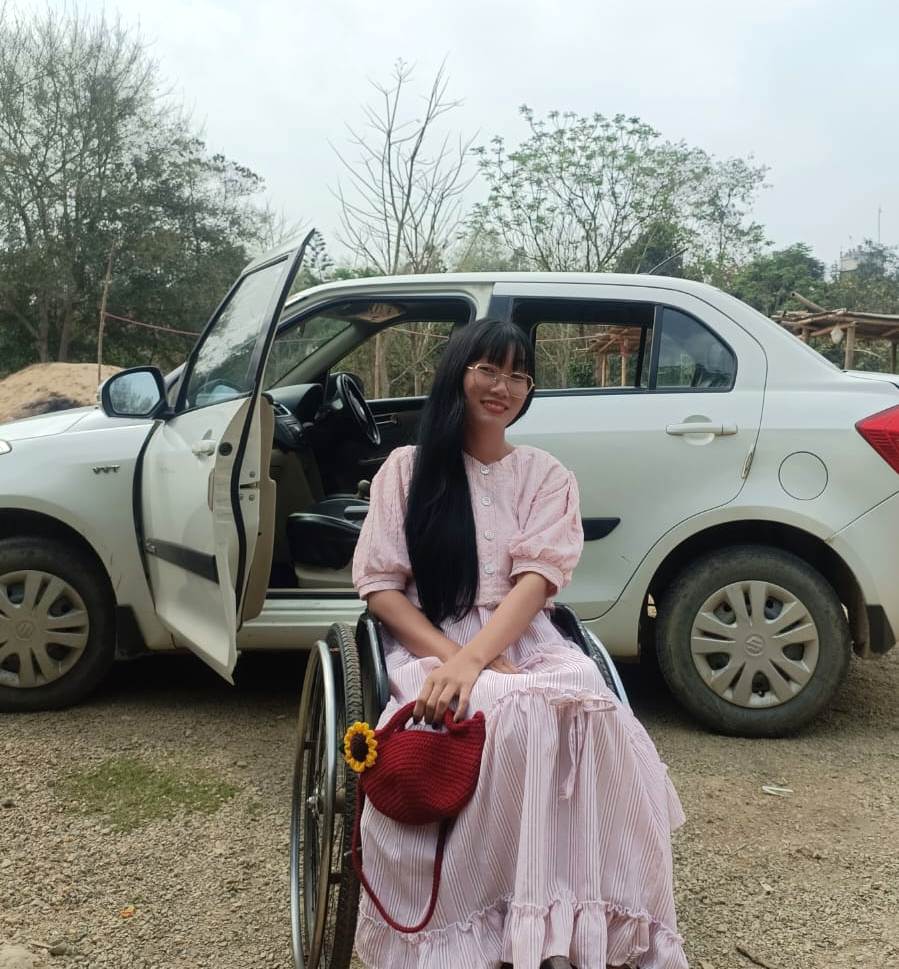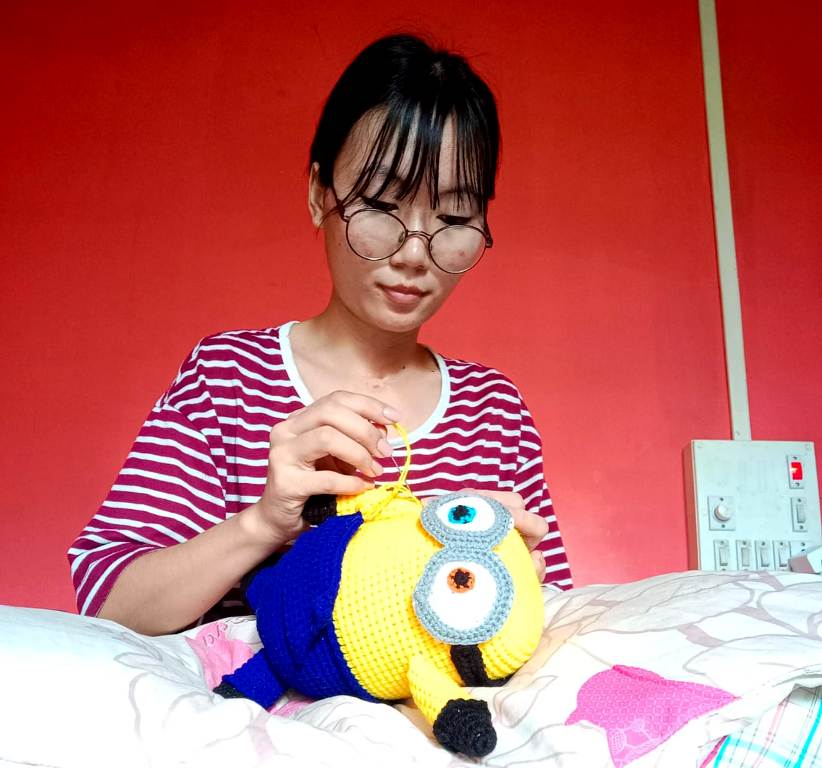FRIDAY, APRIL 25, 2025
- Home
- Stitching independence: Naga woman challenges disability stereotypes
Stitching independence: Naga woman challenges disability stereotypes
Published on Apr 16, 2025
By Veroli Zhimo
Share
-

Inaholi Zhimo with a teddy bear she crafted.
- DIMAPUR — In a world that often perceives persons with disabilities (PwDs) solely as dependent and in need of assistance, Inaholi Zhimo, a 30-year-old entrepreneur from Nagaland, is quietly rewriting the narrative—one crochet stitch at a time.
- Inaholi’s journey into entrepreneurship began in 2021, when she taught herself crochet through YouTube tutorials. What started as a hobby—much like her earlier experiments with artificial flowers—soon took on a deeper meaning.
- “I wanted to be economically independent, at least,” she says. “I was already physically dependent on my family. I didn’t want to rely on them for everything.”
- Her breakthrough came when she met Ashe Kiba, a prominent disability rights activist in Nagaland. That encounter, she says, gave her the push she needed to see herself differently. “Meeting other PwDs who were living independently made me realise I could do more than just stay at home.”
- Inaholi’s physical challenges stem from a severe case of Japanese encephalitis she contracted in 2009. Hospitalised for over two months—at one point on a ventilator—she was left with 90% locomotor disability. Doctors had little hope for her recovery, but her parents refused to give up, taking her for regular massages and caring for her at home. Over time, she regained movement in her hands.
- The frustration of being confined to her home for nearly two years was overwhelming. “I lashed out at my family often,” she admits. “I didn’t know what to do with myself.” But after connecting with Kiba and enrolling in YouthNet’s first start-up initiative for PwDs, she found a new sense of purpose. Crochet, once a pastime, became her path to financial independence.
Also read: Aadhaar barrier for PwDs in Nagaland
- In 2024, Inaholi formally registered her business, which now operates through her Instagram account, @_craftycrochet_, and is stocked in ‘Made in Nagaland’ stores in Kohima and Dimapur. Her products— amigurumi stuffed toys, accessories, home decor and even traditional waistcoats —are also available on Amazon.
- Working from her home in Thilixu village, she employs a small team of five, including her sister, cousins, and mother, who assist with loin loom weaving and stitching. “I don’t call them employees; we’re a team,” she clarifies. Payments are made per project, and the business generates between INR 10,000 and INR 20,000 monthly on average.

Inaholi Zhimo
- Barriers that remain
- Despite this, Inaholi faces persistent challenges. Public spaces in Dimapur and much of Nagaland remain largely inaccessible to wheelchair users. “I can’t just open a shop because most places aren’t designed for me,” she says. Even routine tasks, like visiting markets, require her to be carried by family members when stairs or uneven pathways block her way. As a result, procuring of raw materials is done by her team members or through online stores.
- In terms of social welfare benefits, Inaholi was unaware she qualified for a disability pension until the family of a deceased beneficiary informed her family about the available scheme. “We only applied after learning about it from others,” she says.
- She also noted that many PwDs may be missing benefits simply due to lack of information, as “there’s no proper system to inform people like us about these programmes.”
- Message of inclusion
- Inaholi’s experiences in public spaces have been marked by moments of frustration. She recalls how people often ignore her, directing questions about her disability to her companions instead. “It makes me feel invisible,” she says, like she is only seen for her disability and not for what she can do.
- “Disability does not define a person—strength, courage, and talent do,” she adds.
 Inaholi Zhimo
Inaholi Zhimo
- She goes on to say that asking for accessibility and inclusion is not “favour or special treatment.”
- “We are simply asking for respect, inclusion and equal space in society. Being disabled is not a weakness; it's simply a part of who we are. Our abilities, dreams and voices matter just like anyone else’s,” she asserts.
- For now, Inaholi continues to grow her business from home, adapting her workspace to her needs. She dreams of expanding—perhaps with a proper storefront, if accessibility improves—and hopes her story inspires others to see PwDs not as recipients of charity but as capable contributors to the economy.
- “Let’s create a world where everyone has the right to access places,” she says, “where kindness is normal, and people are valued for what they can do—not judged by who they are.”
- (This report is facilitated by the Sarthak LIC HFL Initiatives)

